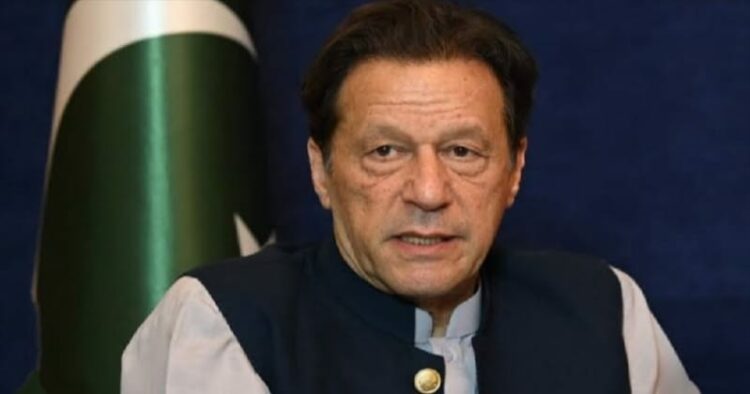Post May 9, 2023, former Pakistan Prime Minister Imran Khan can be best described as a politician created by the army and who grew up to defy the forces and has polarised his country by throwing up a challenge to the army for its unbridled political power.
Imran Khan had risen to power helped by the army by convincing the voters that he was the only clean politician in Pakistan – and that everyone else Shehbaz Sharif, Bhuttos and Zardaris were corrupt. But since his defeat in the no-trust motion, he has successfully circulated a theory that everyone opposing him is not only corrupt but an American puppet and so a traitor.
The army bosses were not spared. ‘Eight killed in clashes as Imran lands in custody’ – screamed a news headline on May 11.
On May 9, Imran Khan was arrested. In a bid to control the worsening situation due to post-arrest violence, the authorities have called in the military in Punjab, Khyber Pakhtunkhwa, and Islamabad.
The deployment came a day after protesters stormed the residence of the corps commander in Lahore and tore down a gate of GHQ in Rawalpindi. Such anti-army protests were unthinkable even a few years back.
Imran Khan’s flip-flop on a variety of relations with the army also brought into light certain ugly things about the Pakistan army and its generals in public debate. Imran’s arrest comes a day after the powerful military rebuked him for repeatedly accusing a senior military officer of ISI trying to engineer his assassination.
Imran Khan had also accused former armed forces chief Gen (retd) Qamar Javed Bajwa of being responsible for his ouster from power in April 2022.
Pakistan has a long history of incarcerating individuals who have held the country’s top executive office. All of it started way back in January 1962 when Huseyn Shaheed Suhrawardy, the fifth Prime Minister of Pakistan, was put behind bars by Gen Ayub Khan.
For similar and different reasons, Zulfikar Ali Bhutto, his daughter Benazir Bhutto and popular leader Nawaz Sharif also faced the same fate. Even now, the new dispensation in Islamabad, headed by Nawaz Sharif’s brother Shehbaz Sharif is backed by the army. One may also add that Benazir Bhutto’s son and Zulfikar Ali Bhutto’s grandson Bilalwal Bhutto Zardari too – paradoxically – is part of the new Government.
Yet things look moving towards a direction not scripted by the army.
“…..Imran Khan’s enduring popularity was evident hours after his arrest on Tuesday when his many diehard loyalists took to the streets in protests across the country. Echoing Khan’s rhetoric, many raged against the military and called for early general elections,” writes Hannah Ellis-Petersen, South Asia correspondent for London-based ‘The Guardian’.
But the fallout of Imran Khan’s mass protest against the army will have a lethal impact. Of course, he is not only playing his politics selfishly and promising moon to a governance-starved population; Imran Khan has taken Pakistan onto a dangerous route. Has he ‘divided’ his country already?
“He behaved like a child who realises for the first time that other children have birthdays too. Because he (Imran Khan) believed that if he wasn’t in charge of the house, he might as well burn it down,” says Karachi-based writer Mohammed Hanif.
But at the end of the day, Pakistan citizens have some of the best-misplaced dreams. In typical Punjabi and Urdu – many dub Pakistanis as a ‘Haari hui kaum’ (a community of big-time and constant losers).
Amid these dreams, notwithstanding the worst of the financial crisis, Imran Khan has promised very big to the people. He tells them — “I can make a difference and deliver you a ‘Naya Pakistan’ where everything is near perfect and people are happy and prosperous”. While an overwhelming section seems to believe him, there is no concrete question being asked why his Government failed between 2018 and April 2022.
And no one has asked what his economic policy will be. He is himself clueless, but his demagogue variety of images still sells.
Things are nevertheless tough for Imran Khan, a one-time continental ‘playboy’ and cricket icon. He is now facing dozens of cases relating to corruption and sedition, which he alleges are politically motivated.
In March, news surfaced that he managed to evade arrest by escaping to a neighbour’s house.
But on the evening of his arrest on May 9, Imran Khan told his supporters in a video he would be “closed inside in an unlawful case” and that he “may not get a chance to address them again”.
Pakistani intellectuals are trying to realise the deep-hole crisis the country is in.
“The backlash this time (after Imran’s arrest) has been fierce. Images are being circulated on social media of attacks on GHQ and the house of the Lahore corps commander in flames. Both appeared unguarded. Their gates opened at the sight of a mob. A country of 230 million people expects all organs of state responsible for its safe governance to behave with circumspection and mature self-control,” says F S Aijazuddin, a Pak writer.
“Have they forgotten that such riots are the seeds of a revolution?,” he throws up the right question. The veiled references remind us of Sri Lanka.



















Comments